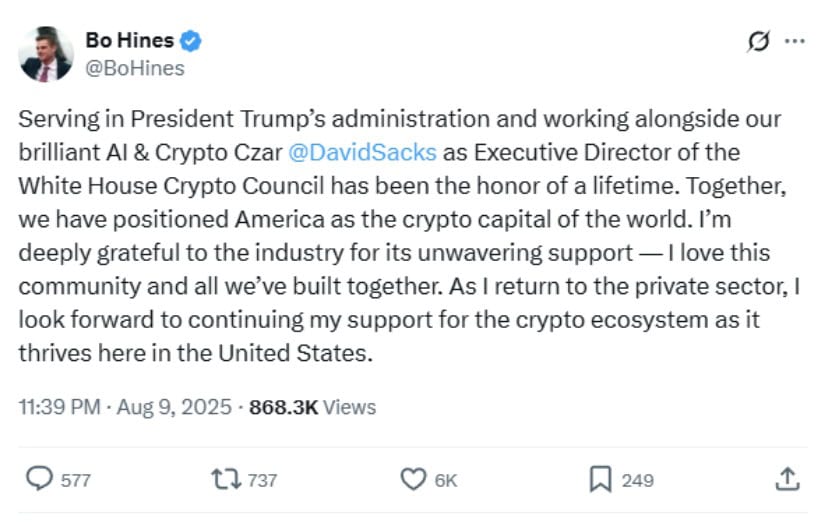Trump’s Crypto Guru Bo Hines Exits as US Bitcoin Reserve Strategy Gains Momentum
Political shakeup meets digital gold rush—Washington's crypto chessboard just lost a key player.
Bo Hines, former Trump advisor and Bitcoin advocate, steps down amid escalating plans for a national crypto reserve. The move sparks speculation about power struggles in DC's pro-crypto faction.
Meanwhile, Treasury officials quietly fast-track infrastructure for what insiders call 'Operation Satoshi'—because nothing says fiscal responsibility like betting the nation's future on volatile internet money.
Key questions remain: Who'll fill Hines' role? Will the Fed finally admit they're mining BTC in the basement? One thing's certain—when politics and crypto collide, the only guarantee is volatility.

After eight months leading the Presidential Council of Advisers for Digital Assets, Hines is returning to the private sector while America’s plans to build a strategic Bitcoin reserve continue under new leadership.
The departure comes at a critical time for U.S. crypto policy, as the Trump administration works to establish the country as the “crypto capital of the world” through ambitious digital asset initiatives.
Hines Built Foundation for Crypto Policy
During his tenure as Executive Director of the White House Crypto Council, Hines helped shape America’s approach to cryptocurrency regulation and policy. He worked closely with David Sacks, Trump’s AI and Crypto Czar, to advance several key initiatives that positioned the U.S. as a leader in digital assets.
The council under Hines’ leadership produced a comprehensive 163-page report in July 2025 that outlined the administration’s crypto strategy. This document provided a framework for digital asset oversight and coordinated efforts across federal agencies to strengthen blockchain policy and innovation.
Hines also championed the creation of a national bitcoin strategic reserve, promoting budget-neutral ways to acquire more Bitcoin without costing taxpayers money. His approach included reallocating seized digital assets and potentially revaluing the government’s gold holdings to fund Bitcoin purchases.
The former North Carolina State football player brought an unconventional background to crypto policy. He earned his law degree from Wake Forest University in 2022 and unsuccessfully ran for Congress twice before TRUMP selected him for the crypto role in December 2024.
America’s Bitcoin Reserve Takes Shape
The Trump administration has made significant progress on establishing a strategic Bitcoin reserve, even as implementation details remain limited. In March 2025, President Trump signed an executive order creating both a Strategic Bitcoin Reserve and a separate U.S. Digital Asset Stockpile.
The executive order defines Bitcoin as “digital gold” because of its fixed supply of 21 million coins and its security record. The government currently holds more than 207,000 Bitcoin, worth approximately $17 billion, making it one of the largest Bitcoin holders globally.
The reserve will be built primarily from digital assets seized in criminal and civil cases. The Treasury and Commerce departments have been directed to develop budget-neutral strategies for acquiring additional Bitcoin without imposing costs on American taxpayers.
Trump initially announced the reserve WOULD include other cryptocurrencies like XRP, Solana, and Cardano, causing their prices to jump. However, many crypto advocates prefer a Bitcoin-only approach, arguing it’s the most tested and decentralized digital asset.
Mixed Results on Implementation Speed
While Hines helped establish the policy framework for America’s Bitcoin reserve, the initiative has faced criticism for its slow pace and limited transparency. The July 2025 WHITE House crypto report provided broad summaries of the reserve concept but offered few new implementation details.
Hines had previously assured crypto investors that infrastructure work was underway for the Bitcoin reserve and that people would be “very pleased” with the results. However, specific timelines and acquisition methods remain unclear.
The administration faces the challenge of building government infrastructure to securely manage large amounts of cryptocurrency while developing policies that don’t interfere with the decentralized nature of digital assets.
New Leadership Steps Forward
Patrick Witt, who served as Hines’ deputy director, is expected to take over leadership of the Crypto Council. Witt brings experience from the Department of Defense, where he worked as acting director of the Office of Strategic Capital.
David Sacks praised Hines’ work and confirmed that Witt and Harry Jung, a senior policy adviser at the Commodity Futures Trading Commission, are ready to implement the council’s recommendations and advance crypto legislation like the Clarity Act.
The leadership change comes as the administration continues pushing pro-crypto policies, including the recently passed GENIUS Act, which created regulations for stablecoin issuers. The House has also passed the broader Clarity Act, which aims to establish federal rules for crypto markets.
Looking Ahead
Hines announced he would remain involved with the administration as a special government employee, advising on artificial intelligence initiatives alongside Sacks. He expressed gratitude to the crypto community for its support during his tenure.

Source: @BoHines
The Bitcoin reserve initiative represents a major shift in how the U.S. government views cryptocurrency. Unlike traditional strategic reserves of oil or medical supplies, a crypto reserve positions digital assets as tools for national economic strategy and financial resilience.
Some economists warn that government involvement in crypto markets could create conflicts of interest and influence prices. However, supporters argue that early adoption of Bitcoin as a strategic asset gives the U.S. an advantage as more countries explore similar programs.
What This Means for Crypto’s Future
Hines’ departure marks a transition rather than a setback for U.S. crypto policy. The policy foundations he helped build continue under new leadership, with the administration maintaining its commitment to making America the global leader in digital assets.
The success of America’s Bitcoin reserve will likely influence other countries considering similar programs and could reshape how governments view cryptocurrency as a strategic asset alongside traditional reserves like Gold and oil.

